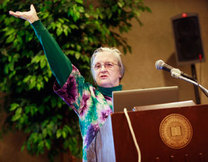Sustainable Economy

Thinking like a Region in a Globalized World.
Economic decisions and strategies are all based in political contexts, and are programs designed and characterized by human initiatives.
Regional and local economies strengthen communities by keeping more dollars local; by promoting participation in the economy by individuals and organized business interests that care about local quality of life including the environment; and by promoting the well-being of the humans that live in the region. A local economy is the most sustainable economy. A strong local economy makes for a strong, livable, and thriving region. This is a fundamental issue of local and regional security.
The politics of economics often determine the strength of local economies. Globalized interests such as multi-nationals often have little interest in the quality of life of the communities in which they extract profits. Those profits allow for large scale political control which tend to focus almost exclusively on wealth building for the global interests and not for the communities effected or the people that live there. You may have heard of statistics that say that in the United States the top 1% owns as much wealth as the bottom 90%, or that as few as 500 individuals control as much wealth as 50% of the American population, or more than 150 million people. Those are staggering figures that point to a widening divide between the rich and the poor. This reality does little to solve cultural problems such as poverty and social unrest. Working toward creating strong local economies as opposed to allowing local wealth to be extracted by global interests is a sustainable political strategy.
A Sustainable Economy recognizes the importance of environment and society and understands that the environment is the bottom line. The environment and social costs are not externalized. It is connected to a variety of social, political, historic, cultural, and environmental contexts. A sustainable economy promotes the best case human quality of life strategies by defending the environment and bringing the best value to communities by stressing equity, justice, and participation.
Economic Security is a fundamental context of a sustainable future. How to create a strong platform for that security is challenging to local economies. This is due in great part to globalization strategies that use local economic extraction formula's to bolster growth.
Economic Globalization is a political strategy promoted by fundamental free market capitalism. This form of capitalism believes that the marketplace will correct all errors, including environmental and social collapse. This political strategy embraces the hidden hand that eliminates regulation and promotes profit at the expense of environment and social issues. These issues, which have a tremendous economic impact, are considered "external costs" that are not recognized as part of the free market system.
Economic Globalization promotes a non-local concentration of wealth and power that does not always respect the best interests of the environment and society, two of the three pillars of sustainability. Environmental and cultural costs of economic development -the "externalities", are not factored into the real costs of economic development. These external costs including environmental degradation and social costs such as degraded human health costs that are often associated with economic practices (such as man made toxics released into the environment, and habitat loss which effects clean air and water) are costs that are born by the overall society. These costs include subsidies such as taxation, unequal access to health care, low wages, and crumbling communities. This is not a sustainable economic model.
A sustainable locally based Economy brings the most benefit to the most people. It helps to narrow the divide between the rich and the poor. It is at the heart of an economic strategy that represents a path to a future that works.
Economic decisions and strategies are all based in political contexts, and are programs designed and characterized by human initiatives.
Regional and local economies strengthen communities by keeping more dollars local; by promoting participation in the economy by individuals and organized business interests that care about local quality of life including the environment; and by promoting the well-being of the humans that live in the region. A local economy is the most sustainable economy. A strong local economy makes for a strong, livable, and thriving region. This is a fundamental issue of local and regional security.
The politics of economics often determine the strength of local economies. Globalized interests such as multi-nationals often have little interest in the quality of life of the communities in which they extract profits. Those profits allow for large scale political control which tend to focus almost exclusively on wealth building for the global interests and not for the communities effected or the people that live there. You may have heard of statistics that say that in the United States the top 1% owns as much wealth as the bottom 90%, or that as few as 500 individuals control as much wealth as 50% of the American population, or more than 150 million people. Those are staggering figures that point to a widening divide between the rich and the poor. This reality does little to solve cultural problems such as poverty and social unrest. Working toward creating strong local economies as opposed to allowing local wealth to be extracted by global interests is a sustainable political strategy.
A Sustainable Economy recognizes the importance of environment and society and understands that the environment is the bottom line. The environment and social costs are not externalized. It is connected to a variety of social, political, historic, cultural, and environmental contexts. A sustainable economy promotes the best case human quality of life strategies by defending the environment and bringing the best value to communities by stressing equity, justice, and participation.
Economic Security is a fundamental context of a sustainable future. How to create a strong platform for that security is challenging to local economies. This is due in great part to globalization strategies that use local economic extraction formula's to bolster growth.
Economic Globalization is a political strategy promoted by fundamental free market capitalism. This form of capitalism believes that the marketplace will correct all errors, including environmental and social collapse. This political strategy embraces the hidden hand that eliminates regulation and promotes profit at the expense of environment and social issues. These issues, which have a tremendous economic impact, are considered "external costs" that are not recognized as part of the free market system.
Economic Globalization promotes a non-local concentration of wealth and power that does not always respect the best interests of the environment and society, two of the three pillars of sustainability. Environmental and cultural costs of economic development -the "externalities", are not factored into the real costs of economic development. These external costs including environmental degradation and social costs such as degraded human health costs that are often associated with economic practices (such as man made toxics released into the environment, and habitat loss which effects clean air and water) are costs that are born by the overall society. These costs include subsidies such as taxation, unequal access to health care, low wages, and crumbling communities. This is not a sustainable economic model.
A sustainable locally based Economy brings the most benefit to the most people. It helps to narrow the divide between the rich and the poor. It is at the heart of an economic strategy that represents a path to a future that works.
What are Externalities?
David Suzuki on Externalities-
"Conventional Economics is a form of Brain -Damage"
Presented by The Sustainable Man
More on Externalities
Learning about sustainability is about learning about the interdependency between economics, culture and society, and the environment. Most sustainability experts believe that the real bottom line in this relationship is the environment. A healthy productive environment with intact ecosystems supports all life on earth, including ours. Extracted, polluted, vanished, commercialized, commodified natural resources act against life, not for it. Across the board, our economic systems and especially capitalism, treat environment as an "externality".
Characterizing environment as an "externality" means that the value of the economy is predicated on profitability. This profitability traditionally defines natural resources as commodities to be extracted. This avoids measuring ecological services costs and the real economic impact of pollution. The costs that accrue due to environmental exploitation are not factored into the profitability equation. Those costs, which include ecological services such as cleaning air and water, providing temperature and atmospheric moderation, and legalized pollution, are passed on to society.
For example- our political economic culture values an acre of forest in terms of its value as a commodity- board feet of timber. When that timber is extracted and sold on the market, its value counts toward GDP. This kind of valuation and the profit that is rendered to the seller, helps to measure growth. If we factored in the "external" costs, which many economists characterize as "unmeasurable", we might redefine how we use natural resources to create profit.
The actual quantifiable value of the ecological services rendered by an acre of forest, or an intact ecosystem which is completely destroyed by timber extraction, or a mountain top removed for coal, or lands and biodiverse habitat fragmented or destroyed by gas and oil exploration and distribution, or the legalized and intentional pollution of our lakes, rivers, streams, oceans, wetlands, vanishing wildlands, and atmosphere is considered to be an externality and is not measured as a real cost to the profit taker, often a business, often a very large multi-national corporation that has its hooks deeply into political decision makers.
The quantifiable costs of cleaning water and air are born by you and I and not the profit taker that have caused the damage. This institutionalized economic structure, measuring the environmental costs as "externalities" hides the real costs and transfers them to society.
One of the great costs that is transferred to society are costs associated with human health. The ground breaking book "Poisoned for Profit; How Toxins are making Our Children Chronically Ill investigates how our economic policies have submerged our planet in a thickening haze of toxic soup. It exposes that in the USA today, because of man made toxins and pollution, one in three children are born sick, most with disease that will have lifelong consequences. The costs of these lives and the dollars to care for sick people are just one of the consequences of externalizing the costs of environmental destruction. Read more about this here
Another great "externality" cost to society is picking up the tab of damage created by human caused climate change. Real dollar costs of disasters including Hurricane Katrina, Sandy, and devastating droughts, heat waves and other unprecedented atmospheric events are currently in the trillions of dollars, in the USA alone, and will only climb. Most of these costs are born by the public, often government, and often individuals.
David Suzuki, in the video above, calls our economic strategies of defining the environment as an economic externality, as "brain damage". The costs of human health, climate change, war, and the disasters that accompany these tragedies lead to cultural and social unrest. Some believe that we are headed for a collapse, an economic collapse, a cultural collapse, and an environmental collapse that will render the concept of sustainability irrelevant. Some argue that we are already at the collapse.
Read more about real valuations of the environment in the "Ecological Economics" section found below.
Characterizing environment as an "externality" means that the value of the economy is predicated on profitability. This profitability traditionally defines natural resources as commodities to be extracted. This avoids measuring ecological services costs and the real economic impact of pollution. The costs that accrue due to environmental exploitation are not factored into the profitability equation. Those costs, which include ecological services such as cleaning air and water, providing temperature and atmospheric moderation, and legalized pollution, are passed on to society.
For example- our political economic culture values an acre of forest in terms of its value as a commodity- board feet of timber. When that timber is extracted and sold on the market, its value counts toward GDP. This kind of valuation and the profit that is rendered to the seller, helps to measure growth. If we factored in the "external" costs, which many economists characterize as "unmeasurable", we might redefine how we use natural resources to create profit.
The actual quantifiable value of the ecological services rendered by an acre of forest, or an intact ecosystem which is completely destroyed by timber extraction, or a mountain top removed for coal, or lands and biodiverse habitat fragmented or destroyed by gas and oil exploration and distribution, or the legalized and intentional pollution of our lakes, rivers, streams, oceans, wetlands, vanishing wildlands, and atmosphere is considered to be an externality and is not measured as a real cost to the profit taker, often a business, often a very large multi-national corporation that has its hooks deeply into political decision makers.
The quantifiable costs of cleaning water and air are born by you and I and not the profit taker that have caused the damage. This institutionalized economic structure, measuring the environmental costs as "externalities" hides the real costs and transfers them to society.
One of the great costs that is transferred to society are costs associated with human health. The ground breaking book "Poisoned for Profit; How Toxins are making Our Children Chronically Ill investigates how our economic policies have submerged our planet in a thickening haze of toxic soup. It exposes that in the USA today, because of man made toxins and pollution, one in three children are born sick, most with disease that will have lifelong consequences. The costs of these lives and the dollars to care for sick people are just one of the consequences of externalizing the costs of environmental destruction. Read more about this here
Another great "externality" cost to society is picking up the tab of damage created by human caused climate change. Real dollar costs of disasters including Hurricane Katrina, Sandy, and devastating droughts, heat waves and other unprecedented atmospheric events are currently in the trillions of dollars, in the USA alone, and will only climb. Most of these costs are born by the public, often government, and often individuals.
David Suzuki, in the video above, calls our economic strategies of defining the environment as an economic externality, as "brain damage". The costs of human health, climate change, war, and the disasters that accompany these tragedies lead to cultural and social unrest. Some believe that we are headed for a collapse, an economic collapse, a cultural collapse, and an environmental collapse that will render the concept of sustainability irrelevant. Some argue that we are already at the collapse.
Read more about real valuations of the environment in the "Ecological Economics" section found below.
Ecological Economics - Protecting the Environment
One of the great sources of wealth on planet earth has been our environment and the natural resources that the environment provides. Today we are in a global condition that portends the end of environmental sustainability. It is critical that we understand and try to become better economic stewards of our environment. Our future success depends upon this. The business community often hears that “environmentalists” refuse to use the environment in any productive way to create wealth.” Sustainability experts disagree. Instead of just commodifying the environment, for example turning forests in to lumber products, sustainability experts say that forests and other ecological conditions nurture wealth, health, and well-being. Traditional economics identifies the value of an intact ecosystem an “externality”. For example, this value stares that "the only value of a forest" is the value that can be counted in the price of lumber per board feet. This is how we count our GDP. This is our fundamental economic framework. Ecological economists recognize that an acre of intact ecosystem such as a forest or a marsh or an estuary, is worth several hundred times more than an acre of clear-cut forest. The value lies in the ecological benefits of clean water, clean air, and a balanced, life-sustaining atmosphere. The multipliers of ecological economic values include the comparative cost to artificially clean air and water, and pay for the resulting health benefits. Ecological economist Robert Costanza led an evaluation of the earths ecosystems that suggested an annual ecological GDP of of $54 trillion while traditional economics provided an annual global GDP of $24 trillion. Ecology counts. It is how the earth works economically for humans. Ecological Economics provides an important scientific and economics exchange. It is highly charged with political discussions including the costs and values of climate change, agriculture, industrial pollution, and energy. The politics of these discussions, and the politics of economic development provide the nexus of a sustainable future that works, or one that collapses upon itself. |
ResourcesUnited States Society of Ecological Economics International Society of Ecological Economics University of Vermont Gund Institute for Ecological Economics Portland State University Institute for Sustainable Solutions The New Economics Foundation(NEF) Authors and Academics Robert Costanza Elinor Ostrom Herman Daly Bill McKibben Paul Hawken Bill McDonough McDonough TED Presentation (video) Elinor Ostrom wins Nobel Prize
In 2009 the first woman to be awarded the Nobel Prize in Economic Science went to Elinor Ostrom, an American political economist. Essentially her work focused on showing that privatizing natural resources is not the route to halt environmental degradation. To learn more: Wikipedia Article in the Guardian Elinor Ostrom Breaks Nobel Mold Proceedings of the National Academy of Sciences of the United States of America- Profile of Elinor Ostrom |